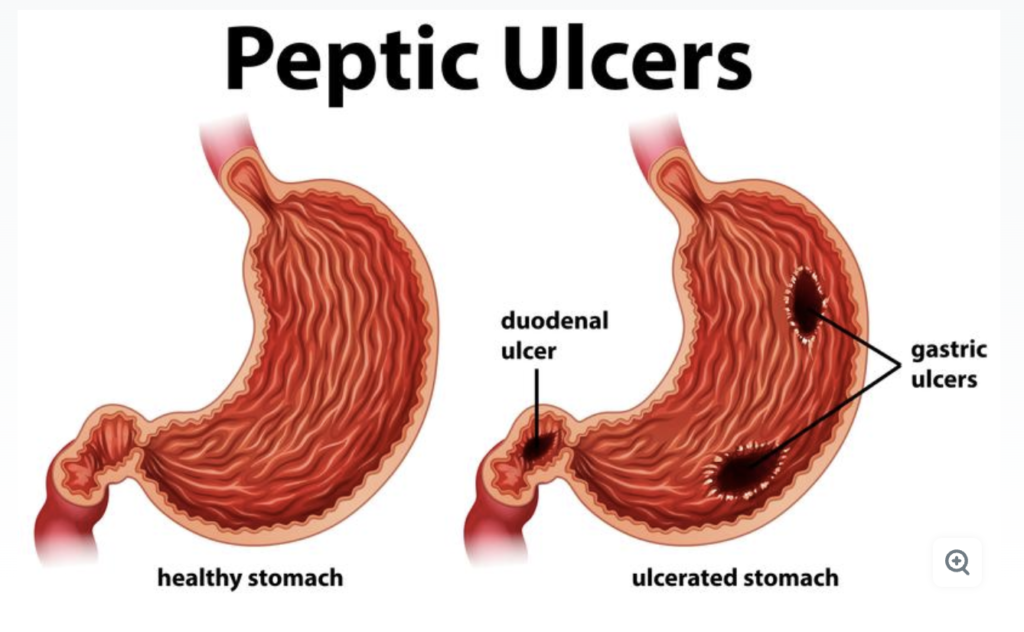Peptic ulcer disease refers to a condition in which there is a sore or lesion that forms in the lining of the stomach, duodenum, or esophagus. These ulcers can cause pain and discomfort in the affected area, and they are often associated with symptoms such as indigestion, heartburn, and nausea.
Peptic ulcers are typically caused by a combination of factors, including infection with the bacteria Helicobacter pylori, prolonged use of nonsteroidal anti-inflammatory drugs (NSAIDs), and excessive alcohol consumption.
Treatment for peptic ulcers typically involves medications to reduce stomach acid and antibiotics to eliminate the bacteria causing the ulcer. In some cases, surgery may be necessary to remove the ulcer or repair damage to the stomach or duodenum. In this article, we will explore the most common symptoms of peptic ulcers and how they can affect daily life.

Who is more likely to get ulcers?
Peptic ulcers are a type of sore that develops in the lining of the stomach or the first part of the small intestine. The condition is quite common and can affect people of all ages and backgrounds. However, some groups of people are more likely to be affected by peptic ulcers than others.
One of the most affected groups of people is those who regularly take nonsteroidal anti-inflammatory drugs (NSAIDs), such as aspirin and ibuprofen, for long periods of time. Other risk factors include smoking, excessive alcohol consumption, and a history of peptic ulcers in the family.
Stress, spicy foods, and certain medical conditions, such as liver, lung, and kidney diseases, can also increase the risk of developing peptic ulcers. In general, it’s important to speak with a doctor if you experience symptoms of peptic ulcers, such as abdominal pain, bloating, nausea, and heartburn, as early treatment can help prevent complications.
Symptoms of peptic ulcer
Peptic ulcer disease is a condition in which sores or ulcers form in the lining of the stomach, duodenum, or esophagus. These ulcers can cause a variety of symptoms, which can vary in severity and duration depending on the individual and the location of the ulcer.
Abdominal pain:
The most common symptom of peptic ulcers is abdominal pain, which may be described as a burning or gnawing sensation in the stomach or upper abdomen. The pain may be intermittent or constant and may be worse at night or after eating. Some people may experience a feeling of fullness or bloat in the abdomen as well.
The location of the pain can vary depending on the location of the ulcer; for example, pain in the upper abdomen may indicate a duodenal ulcer, while pain in the lower chest or upper abdomen may indicate an esophageal ulcer.
Indigestion:
Another common symptom of peptic ulcers is indigestion, which may be characterized by a feeling of discomfort or fullness in the upper abdomen after eating. This may be accompanied by bloating, belching, and nausea. Indigestion can occur at any time, but it may be more common after eating spicy or fatty foods.
Heartburn:
Peptic ulcers in the esophagus can cause heartburn, a burning sensation in the chest that may radiate up into the neck or throat. This symptom is often worse at night or after eating and may be accompanied by a sour taste in the mouth or a feeling of food coming back up into the throat.
Nausea and vomiting:
Some people with peptic ulcers may experience nausea and vomiting, particularly if the ulcer is located in the stomach or duodenum. This symptom may be more common in the morning or after eating and may be accompanied by abdominal pain and indigestion.
Loss of appetite:
Peptic ulcers can cause a loss of appetite or a feeling of early satiety, in which a person feels full after eating only a small amount of food. This may be due to the pain and discomfort caused by the ulcer, or it may be a result of changes in the body’s hormonal or metabolic processes.
Weight loss:
In severe cases, peptic ulcers can cause weight loss due to a lack of appetite and difficulty eating. Weight loss may also be a result of underlying medical conditions, such as anemia or malabsorption, which can occur as a complication of peptic ulcer disease.
Anemia:
Peptic ulcers can cause bleeding in the digestive tract, which can lead to anemia, a condition in which there are not enough red blood cells in the body to carry oxygen to the tissues. Anemia can cause fatigue, weakness, and shortness of breath, and it may require medical treatment, such as blood transfusions or iron supplements.
Dark, tarry stools:
Another sign of bleeding in the digestive tract is dark, tarry stools, which may have a foul odor and a sticky, tar-like consistency. This is caused by the presence of blood in the stool and may require medical attention to determine the underlying cause and to prevent further complications.
Chest pain:
Peptic ulcers in the esophagus can cause chest pain that may be mistaken for a heart attack. The pain may be sharp or dull and may be accompanied by difficulty swallowing or a feeling of food getting stuck in the throat.
Fatigue and weakness:
Chronic peptic ulcer disease can cause fatigue and weakness, particularly if the ulcer is causing bleeding or anemia. These symptoms may make it difficult to perform daily
Peptic ulcers can occur in people of any age, gender, or ethnicity. However, some groups of people may be more susceptible to developing ulcers than others. For instance, individuals who are infected with Helicobacter pylori are at a higher risk of developing ulcers, as this bacteria can damage the protective lining of the stomach and duodenum.
People who regularly use nonsteroidal anti-inflammatory drugs (NSAIDs), such as aspirin or ibuprofen, may also be more likely to develop ulcers, as these drugs can irritate the stomach lining and increase the risk of bleeding.
Additionally, individuals who smoke or consume alcohol in excess may have a higher risk of developing ulcers, as these substances can weaken the stomach lining and increase stomach acid production.
Other risk factors
Other risk factors for ulcers include age, genetics, and stress. Older adults may be more susceptible to developing ulcers due to changes in the digestive system that occur with age. People with a family history of ulcers may also be more likely to develop them themselves.
Stress, while not a direct cause of ulcers, can increase the production of stomach acid and exacerbate existing ulcers. Overall, anyone can develop a peptic ulcer, but certain lifestyle factors and medical conditions can increase the risk.
Causes of peptic ulcers
There could be various causes of peptic ulcer disease, including bacterial infections, lifestyle factors, and the use of certain medications. We will look into the major causes of peptic ulcer and how it gets triggered.
Helicobacter pylori
One of the most common causes of peptic ulcer disease is a bacterial infection called Helicobacter pylori. This bacterium is known to live in the mucous layer that covers the lining of the stomach and duodenum, and it can cause inflammation and damage to the lining, leading to the formation of ulcers.
Helicobacter pylori are highly contagious, and it can be spread through contaminated food and water, as well as through close contact with an infected person. The bacteria can also be transmitted through saliva, which makes it easy for family members to pass the infection to one another. Other risk factors for H. pylori infection include poor sanitation, overcrowding, and poverty.
Use of NSAIDs
Another common cause of peptic ulcer disease is the use of nonsteroidal anti-inflammatory drugs (NSAIDs) such as aspirin, ibuprofen, and naproxen. These drugs are commonly used to treat pain and inflammation, and they work by inhibiting the production of prostaglandins, which are hormone-like substances that regulate inflammation and pain.
However, NSAIDs can also cause damage to the lining of the stomach and duodenum, especially when taken in high doses or for prolonged periods of time. This damage can lead to the formation of ulcers and can increase the risk of bleeding and other complications.
Faulty Lifestyle factors
In addition to bacterial infections and the use of NSAIDs, lifestyle factors such as smoking and excessive alcohol consumption can also contribute to the development of peptic ulcer disease. Smoking has been shown to increase the production of stomach acid and decrease the production of protective mucus, which can make the lining of the stomach more susceptible to damage. Similarly, excessive alcohol consumption can also increase the production of stomach acid and damage the lining of the stomach and duodenum.
Other Risk Factors
Other risk factors for peptic ulcer disease include age, genetics, and underlying medical conditions such as liver disease, kidney failure, and chronic obstructive pulmonary disease (COPD). Older adults are more likely to develop peptic ulcers due to changes in the digestive system that occur with age.
Genetics can also play a role in the development of peptic ulcers, as certain individuals may be more susceptible to bacterial infections or may have a higher risk of developing NSAID-induced ulcers. Medical conditions that affect the liver, kidneys, or lungs can also increase the risk of peptic ulcer disease due to the effects that these conditions have on the digestive system.
Therefore in short, we may infer that peptic ulcer disease is a common medical condition that can be caused by a variety of factors, including bacterial infections, the use of NSAIDs, lifestyle factors, and underlying medical conditions.
While many cases of peptic ulcer disease can be successfully treated with medication and lifestyle changes, it is important to identify and address the underlying cause of the condition in order to prevent recurrence and avoid complications such as bleeding and perforation.
If you are experiencing symptoms of peptic ulcer disease, such as abdominal pain, nausea, or vomiting, it is important to consult with your healthcare provider for an accurate diagnosis and appropriate treatment.
Does spicy food or hot beverages aggravate peptic ulcers

There is a common misconception that spicy foods and hot beverages can cause or aggravate peptic ulcers. However, research has shown that while these foods and drinks can cause discomfort and may worsen existing symptoms in some individuals, they do not actually cause peptic ulcers.
Peptic ulcers are primarily caused by factors such as Helicobacter pylori infection, the use of nonsteroidal anti-inflammatory drugs (NSAIDs), and lifestyle factors such as smoking and excessive alcohol consumption. In fact, some research has suggested that spicy foods and hot beverages may actually have a protective effect against the development of peptic ulcers, as they can stimulate the production of protective mucus in the stomach lining.
That being said, it is important to note that spicy foods and hot beverages can still be a source of discomfort for individuals with peptic ulcers or other digestive conditions. Spicy foods can irritate the lining of the stomach and duodenum, leading to symptoms such as abdominal pain, nausea, and bloating. Hot beverages such as coffee and tea can also increase the production of stomach acid and may worsen symptoms in some individuals.
Therefore, individuals with peptic ulcers or other digestive conditions may benefit from avoiding or limiting their consumption of spicy foods and hot beverages, especially if these foods and drinks worsen their symptoms. It is also important to consult with a healthcare provider for personalized recommendations on managing symptoms and preventing complications.
Treatments for peptic ulcers including home remedies
Peptic ulcers are a common medical condition that affects millions of people worldwide. They are characterized by the formation of sores or lesions in the lining of the stomach, duodenum, or esophagus, and can cause pain, discomfort, and other symptoms. Treatment for peptic ulcers may vary depending on the underlying cause of the condition, the severity of symptoms, and the presence of any complications. In this essay, we will discuss the various treatment options available for peptic ulcers, including medication, lifestyle changes, and home remedies.
Medication:
The most common treatment for peptic ulcers is medication, which may include antibiotics, proton pump inhibitors (PPIs), H2 blockers, and antacids. Antibiotics are typically used to treat peptic ulcers caused by Helicobacter pylori, a bacterial infection that is a common cause of peptic ulcers. PPIs and H2 blockers are both types of acid-reducing medications that work to decrease the amount of acid in the stomach, which can help to promote healing of the ulcers. Antacids may also be used to provide short-term relief of symptoms by neutralizing stomach acid.
Lifestyle Changes:
In addition to medication, lifestyle changes can also play an important role in the treatment of peptic ulcers. Lifestyle changes may include avoiding spicy foods, reducing or eliminating alcohol and caffeine intake, quitting smoking, and eating smaller, more frequent meals. These changes can help to reduce inflammation in the digestive system and decrease the production of stomach acid, which can help to promote the healing of the ulcers. It is also important to manage stress, as stress can exacerbate symptoms and delay healing.
Home Remedies:
There are also a variety of home remedies that can be used to alleviate the symptoms of peptic ulcers and promote healing. One popular home remedy is to drink a mixture of honey and warm water on an empty stomach each morning. Honey has antibacterial properties and can help to promote healing of the ulcers, while warm water can help to soothe the digestive system. Another home remedy is to drink a mixture of aloe vera juice and water, which can help to reduce inflammation and promote the healing of the ulcers.
Another popular home remedy is to consume a mixture of equal parts apple cider vinegar and water before meals. Apple cider vinegar is believed to help promote digestion and reduce inflammation in the digestive system. It is important to note, however, that there is limited scientific evidence to support the use of home remedies for the treatment of peptic ulcers, and that they should be used in conjunction with medical treatment and under the guidance of a healthcare provider.
Surgery:
In rare cases, surgery may be necessary to treat peptic ulcers that do not respond to medication or lifestyle changes. Surgery may involve removing damaged tissue or repairing a perforation or blockage in the digestive system. Surgery is typically only recommended in cases where the ulcers are causing significant complications, such as bleeding or obstruction.
In conclusion, peptic ulcers are a common medical condition that can be effectively treated with a combination of medication, lifestyle changes, and home remedies. The most common treatment options for peptic ulcers include antibiotics, PPIs, H2 blockers, and antacids, which work to reduce inflammation and decrease the production of stomach acid.
Lifestyle changes such as avoiding spicy foods, reducing or eliminating alcohol and caffeine intake, and quitting smoking can also help to promote the healing of ulcers. Home remedies such as honey and warm water, aloe vera juice, and apple cider vinegar can also be used to alleviate symptoms and promote healing.
Disclaimer: This information is for educational purposes only, and no medical advice should be inferred from it. Before changing your diet or adding supplements, please talk to your doctor.
The author’s views are his or her own. The facts and opinions in the article have been taken from various articles and commentaries available in the online media and Eastside Writers does not take any responsibility or obligation for them.
Note: Contact our Writers at www.eastsidewriters.com for writing Blogs/Articles on any niche. We have experts in various domains from Technology to Finance and from Spirituality to Lifestyle and Entertainment.






